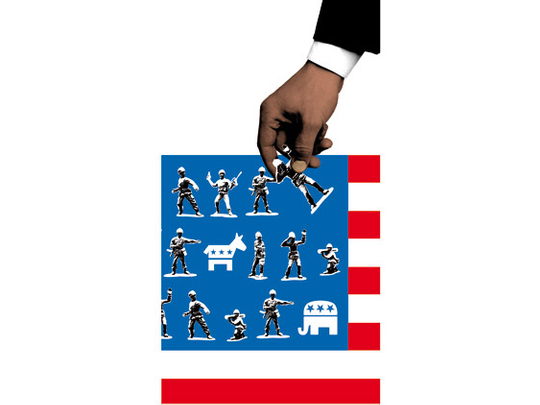
The politics of war has dominated the news in America in recent days. In particular, there has been a concerted effort on the political right to question both President Barack Obama's competence and judgment in the area of national security. The launch pad for these attacks was provided (unintentionally, if fairly predictably) by the release of Bob Woodward's latest book, Obama's Wars.
Woodward rose to fame nearly 40 years ago as one-half of the Washington Post team that broke the story that became the Watergate scandal, setting in motion a chain of events that eventually drove President Richard Nixon from office.
He still works for the Washington Post, but his main activity is book-writing. If journalism is the first draft of history then Woodward is in charge of the second draft: non-fiction tomes that come out every few years; each offering the tantalising prospect of glimpsing a sitting administration's inner workings.
Controversial remarks
Late last month a few excerpts from Obama's Wars were released as part of the book's pre-publication publicity blitz. Two quotes attributed to the president particularly caught the eye of right-wing pundits.
In the first, Obama is said to have told Lindsey Graham, a Republican senator from South Carolina, that his decision to begin withdrawing American forces from Afghanistan in July 2011 is firm.
Like most Republicans, Graham opposes deadlines and timetables, believing they restrain American freedom of action while empowering Washington's enemies. Obama disagreed, reportedly justifying his decision in part with the comment: "I can't let this be a war without end, and I can't lose the whole Democratic Party."
The publication of this remark immediately led to howls of protest on the right: how dare the president allow politics to intrude into matters of war and national security?
But it was the book's other much-cited Obama quote that really sent his opponents into fits of rage.
"We can absorb a terrorist attack," he told Woodward. "We'll do everything we can to prevent it, but even another 9/11, even the biggest attack ever… we absorbed it and we are stronger."
Reaction to this was swift. Speaking on Fox News, John Bolton, once George W. Bush's ambassador to the United Nations, announced: "I think that may be the most outrageous thing that's been reported about this book. How can an American president say that? As if he's a detached observer and doesn't care about Americans dying? I think people have been worried about his qualifications to be commander in chief for a long time and that ought to prove it."
One can dismiss a lot of this as partisan hyperbole. As left-wing commentators were quick to note, Obama has quietly kept many Bush-era national security policies in place. Even his rhetoric about America's ability to "absorb" a new 9/11-like attack closely resembled remarks by a number of Bush administration officials at various times between 2001 and 2008.
Liberals notably unearthed a Bush-era White House press release calling for a greater national effort to "make the system better able to absorb the impact of an event without losing the capacity to function." Certainly sounds like what Obama was saying, does it not?
Ignorance of reality
Political posturing aside, this debate (unsurprisingly) ignored some key realities. Presidents are politicians, and the idea that national security somehow exists in a bubble immune from partisan sniping is a ridiculous fiction rolled out mainly when one party is trying to scare the other into shutting up.
The power of the American presidency is great. As both President Bushes proved, if the man in the White House is determined to take the country to war the rest of the government has few real ways to stop him. As Bush Jr, Lyndon Johnson and others have learned, however, starting a war is one thing. Sustaining it is another.
Obama's reported remark to Graham shows an understanding of this reality that his critics on the right lack. Politics can never entirely be removed from war-time decision-making because democracies can only engage in lengthy wars when those wars enjoy at least some degree of popular backing.
Right-wingers eager both to score political points and to goad Obama into pouring more troops into an open-ended Afghanistan conflict don't seem to understand that they are undercutting their own preferred policy.
Obama knows he could not give America's hawks the escalation they appear to crave even if he wanted to: America's political consensus will not sustain it.
When, if ever, America's war party will come to understand this is far harder to predict.
Gordon Robison is a writer and commentator who has covered the Middle East for print, radio and television since the 1980s, including assignments for ABC News, CNN and Fox. He has also taught Islamic History at Emerson College and Middle East Politics at the University of Vermont.












